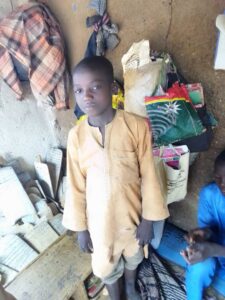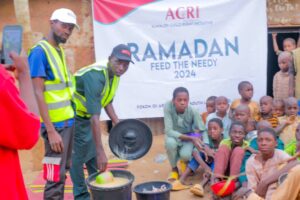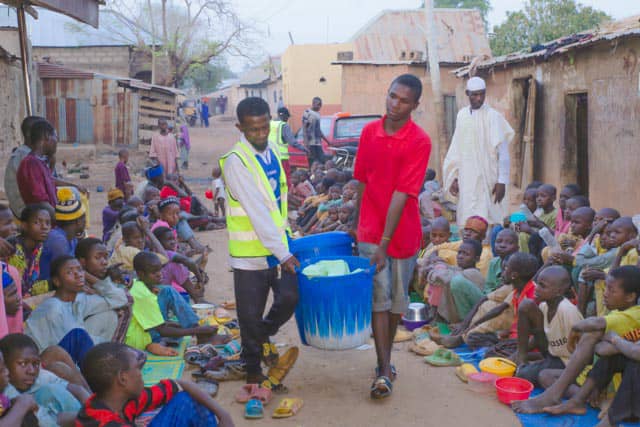“From morning till evening, we move around the streets to look for what to eat and come back only when we find food to continue our evening studies,” Nazir said solemnly.
In Northern Nigeria, a long-standing tradition sends young children to tsangaya schools to acquire Qur’anic knowledge under the care of Islamic scholars known as mallams. However, for many of these children, the quest for education is overshadowed by a daily struggle for survival, leaving them vulnerable to begging and destitution.
An initiative is now transforming the lives of Almajiri children in Sokoto, providing them with access to food and other critical support to ease their burden.
For Nazir, a 12-year-old Almajiri student, the search for food is a daunting daily task. After morning studies at his Islamiyya (Arabic school), where hundreds of children from various backgrounds gather to memorise the Qur’an, he spends hours wandering the streets in search of something to eat.
“From morning till evening, we roam the streets looking for food and only return when we’ve had something to eat,” Nazir explained.
Nazir’s plight is not unique. He is one of the estimated 333 million children globally living in extreme poverty, surviving on less than $2.15 per day. Without basic necessities, these children face severe risks, including malnutrition and long-term health challenges.

Another Almajiri child, Awesu Hassan, recounted a similar ordeal. “Sometimes, we wander the streets all day and only manage to find a little food by nightfall,” he said.
A Lifeline for Almajiri Children
The Almajiri Child Rights Initiative (ACRI), a national organisation established in 2015 and officially registered in 2018, is working to change this narrative. ACRI addresses the systemic issues that drive children into the streets by providing equitable education, livelihood support for children, parents, and mallams, and advocating for social inclusion and child protection.
Since its inception, ACRI has impacted over 5,000 Almajiri children nationwide. Its efforts include distributing food, providing medical care, and supporting education and vocational training for children like Nazir and Awesu.
“Most of our needs have been met, especially food. We no longer wander aimlessly in search of what to eat,” said Awesu, reflecting on the initiative’s impact.
Mallam Faruq, a 38-year-old teacher who oversees Nazir’s school, expressed his gratitude: “The initiative has solved our food challenges, although we still have other needs. The children no longer suffer from constant hunger, and for that, we are deeply thankful.”
The plight of Almajiri children is stark. UNICEF’s 2022 report estimated that there are about 12 million Almajiri children in Nigeria, while the International Rescue Committee (IRC) placed the figure at 13 million. These children often face social exclusion, deprivation of basic rights and limited access to education.
ACRI is tackling these issues by developing a curriculum tailored to the Almajiri school system. The curriculum incorporates accessible education, medical outreach and vocational training to prevent child destitution and human rights abuses.
“As an organisation, we basically provide social inclusion to bridge the gap of almajiri children and ensure that the children become important and well recognised in the community,” said Haruna Mubarak, ACRI’s Executive Assistant and Director of Communications.
“They attended to most of our needs, we are happy and grateful for the initiative, because food especially usually comes with difficulty for the children, but since the disbursement from the initiative, we are being saved from incessant hunger,” he said delightedly.
Rooting Out the Practice
The Almajiri system is deeply entrenched in poverty, illiteracy and cultural practices. Parents often send their children to these schools due to financial constraints and religious beliefs, but the system has deviated from its original purpose, leaving children to fend for themselves.
ACRI is addressing these root causes through community sensitisation and advocacy, educating parents, guardians, and mallams about the dangers of child migration and neglect.

Hassan Muhammad Lada, ACRI’s Northwest Coordinator, highlighted the importance of hygiene and parental involvement: “We sensitised the mallams on the importance of proper hygiene towards the children and the parents, especially to allow their wards to study near them.”
Despite its successes, ACRI faces significant challenges, including resistance from communities and entrenched cultural beliefs.
“Getting people to our side usually proves challenging because they need to be enlightened on the evil of abandoning children without catering for their needs,” Mubarak explained.
Nevertheless, Mubarak emphasised the importance of sustained advocacy. “Sensitisation is key to addressing the problems within the Almajiri system. It’s where the real change begins,” he noted.
By combining advocacy, education, and direct support, ACRI is not only providing immediate relief to Almajiri children but also paving the way for long-term change in Sokoto and beyond.
This story was produced with the support of Nigeria Health Watch through the Solutions Journalism Network, a nonprofit organisation dedicated to rigorous and compelling reporting about responses to social problems.
In Northern Nigeria, many children, known as Almajiri, attend Islamic schools (tsangaya) but face extreme poverty and hunger, often resorting to begging for food. Nazir, a 12-year-old Almajiri, exemplifies this struggle, spending his days searching for meals instead of focusing solely on acquiring Qur’anic knowledge. With over 333 million children globally living in poverty, initiatives like the Almajiri Child Rights Initiative (ACRI) play a crucial role in transforming these children's lives by providing food, education, and vocational training.
Established in 2015, ACRI has reached over 5,000 Almajiri children, offering significant relief from hunger and advocating for social inclusion and protection. The initiative is noteworthy in its efforts to revise the traditional Almajiri system, addressing the root causes of destitution with tailored curriculums, community education, and advocating against child neglect and migration. Despite challenges like resistance from communities due to entrenched cultural beliefs, ACRI emphasizes the importance of sustained advocacy and education to bring about long-term change. Through comprehensive support, ACRI is not only providing immediate relief but also paving the way for systemic transformation in the Almajiri education system in Nigeria.






